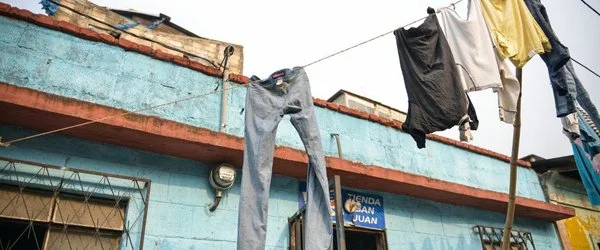Telling the Story With Integrity
It occurred to me, after writing all those posts about La Limonada and the important, inspiring stuff going on there, that some of you may have found yourself harboring suspicions. You may have wondered, for instance: were we being paid to say nice things about Lemonade International in order to trick you into sponsoring a child?
These are reasonable things to wonder, so I thought I’d take a moment to dispel your fears. We bloggers paid for our own airfare, and took time off from work (some of us without paid leave), just because we truly wanted to meet the people of La Limonada and do what we could to tell their stories. In exchange, we were given bunk beds to sleep in, meals to eat, WiFi to use, and transportation to and from La Limonada each day. And, most important of all, the staff gave us their time and, as familiar faces in La Limonada, they vouched for us as we walked the streets – something we’d have been foolish to attempt on our own.
So yes, we do really want you to sponsor a child in La Limonada – or sponsor a teacher, or start a lemonade stand, etc. – but not because we get something tangible out of it. We just have reason to believe these things make a real difference in kids’ lives, and that Lemonade International’s programs represent holistic community development at its best.
I was reminded of this when I saw the Principles of Excellence in Integral Mission, recently published by the Accord Network. As the statement puts it, holistic mission “will be characterized as excellent” when these eight components are in place:
Our Christian faith is at the center of our identity, motive, and manner of being
We acknowledge the reality and significance of the spiritual realm
The Church is central
Transformational practices start with us
We recognize the whole system of poverty
In our relationship journey with the church, our local partners, and the community, we enter as guests, co-labor as partners, and continue as friends
We support local communities and churches in measuring all that matters
We tell the story with integrity
There’s a lot I could say about how the staff of Lemonade International, both those in the community of La Limonada and those supporting the work from elsewhere, put these principles into practice every day.
Notably, there’s no denying the fact that the Christian faith is what drives these folks, as well as what sustains them, and they don’t need to be convinced that there’s a spiritual dynamic at play in the community. Their lives are also marked by the shared desire to be co-laborers and friends, not saviors or twenty-first-century colonialists. Those are a few that are clear.
But it’s that last principle that especially jumped out, because Lemonade International has truly impressed me with its commitment to telling the story with integrity. Here’s how the Accord statement emphasizes that important point:
How we tell the story of the work, and what we choose to say, is a sacred trust between our organizations and the churches, communities, peers, donors, and the poor who work together with us. What we say about the work, to all parties, will be true and transparent, demonstrating the complexity of poverty alleviation, and giving credit everywhere credit is due. What we communicate will honor the view and the voice of those we serve, and reflect our humility and teachable heart by sharing even those hard lessons learned.
The Lemonade International blog is an obvious and consistent example of this commitment to excellence and integrity in storytelling. And through our recent bloggers trip, we were able to join them, doing some storytelling of our own. We were all certainly cognizant of the possibility of exploiting people one way or another through photography and the written word, and none of us wanted to do that, so we talked quite a bit about best practices and we did our best to avoid misrepresenting or dishonoring anyone through our blogs.
But the real test of integrity and excellence in storytelling isn’t whether the storytellers themselves feel they did a good job. The best judges are rather the people whose stories are told.
After most of the bloggers team had left for the airport, Katie and I were waiting for a ride at the Lemonade House with Sam, who leads Lemonade’s micro-enterprise program, when in walked Salma and Alma. We had met Salma and Alma the day before, hearing their gripping, painful stories, and learning about the vocational training they had received to make and sell jewelry.
Now, Salma and Alma said they were interested in seeing the blogs for themselves. We showed them a photo of them with Katie, and then we showed them Paul’s post, in which he recounted their story in full detail.
It was the moment of truth. They had entrusted their stories to us; had we handled them with care?
As Sam translated the post into Spanish, Salma and Alma marveled that Paul had remembered the conversation, seemingly word for word, and had told the story so faithfully. Tears came to their eyes, and they thanked us.
Paul’s post had passed the test. But it served as a good reminder: storytelling with integrity and excellence really matters. The stakes are high because building and keeping trust is essential when it comes to holistic community development. When deciding whether to support a nonprofit focused on community development and poverty alleviation, don’t underestimate the importance of its storytelling.
If an organization doesn’t do this well, it hasn’t earned the right to be trusted – not by you, and certainly not by the people it purports to serve.
If you’ve been impressed with Lemonade International, a great way to begin supporting their work is by participating in their fifth anniversary gala, whether in person in Raleigh or Cincinnati (if you happen to live in the vicinity), or online.
